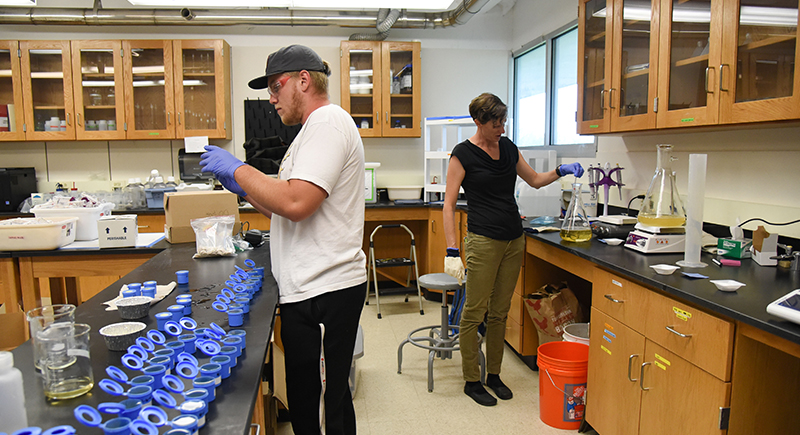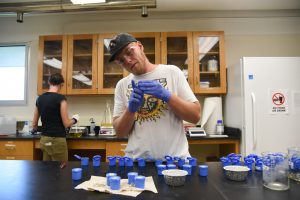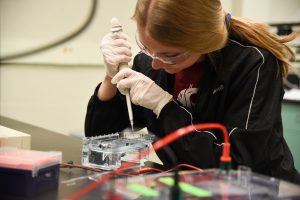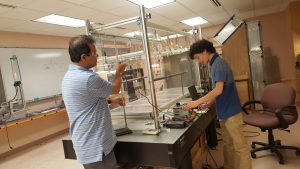
July 3, 2018 Six student research projects presented with Chancellor’s Summer Scholars awards
By Maegan Murray, WSU Tri-Cities
RICHLAND, Wash. – Six student projects were presented with $3,000 as part of the Chancellor’s Summer Scholars program to pursue research in academic fields including environmental and biological sciences, viticulture and enology, mechanical and electrical engineering and fine arts.
The Chancellor’s Summer Scholars Program offers students the opportunity to work collaboratively with a faculty mentor, developing skills to prepare them for a career in the science, technology, engineering and mathematics (STEM) or STEM-related fields. The projects are funded by Washington River Protection Solutions, with Atkins also providing funding for an engineering heat transfer project that is indicated below.

Student Rhenton Brimberry (right) is working with assistant professor Sarah Roley to study the effects of seasonal irrigation flows on microbes and algae in the Yakima River watershed as part of the Chancellor’s Summer Scholars program.
Addressing nutrient pollution in the Yakima River watershed
Student Rhenton Brimberry is working with Sarah Roley, assistant professor of environmental sciences, to study the effects of seasonal irrigation flows on microbes and algae in the Yakima River watershed. Microbes and algae can mitigate nutrient pollution by removing and processing excess nutrients, but most of these assessments have occurred in the non-irrigated midwestern United States. In the irrigated West, seasonal irrigation flows influence nutrient quantity and quality, and so may influence microbial nutrient uptake, as well. By examining algal and microbial responses to nutrient inputs, this project can inform management of nutrient pollution in irrigated agricultural watersheds.
A new method to quantifying mycorrhizal fungi to assist in rebuilding damaged ecosystems

Student Megan Brauner is working this summer to develop and test a new molecular technique for quantifying mycorrhizal fungi in roots and soil as part of the Chancellor’s Summer Scholars program.
Student Megan Brauner is working with Tanya Cheeke, assistant professor of biology, to develop and test a new molecular technique for quantifying mycorrhizal fungi in roots and soil. The fungi, known as arbuscular mycorrhizal fungi, form symbiotic relationships with most plant species, and have been shown to improve native plant growth in disturbed ecosystems. However, quantifying mycorrhizal fungi from environmental samples remains difficult. Development of this technique will be useful for other fungal researchers and will allow further investigation into the effectiveness of mycorrhizal inoculations in ecological restorations.
Effects of native and invasive plants on mycorrhizal colonization
Like Brauner, student Ella Krinitsyn, is working with assistant professor Cheeke on research pertaining to the use of mycorrhizal fungi to restore native plant populations. Her research focuses on on evaluating the correlation between the percentage of mycorrhizal fungi colonization and the percentage of native or invasive plants within sites they are hoping to restore at the Meyer’s Point Environmental Field Station in Olympia, Washington. The project will provide valuable information needed to find effective restoration strategies to improve the growth of native plants and mycorrhizal fungi in landscapes impacted by disturbances.
Manipulation of grape cluster thinning toward improving quality of wine grapes
Student Vince Hewett is working with Bhaskar Bondada, associate professor of wine science, to determine the effects of grape cluster thinning (tipping), removal of flowers and berries at different stages of grapevine development on fruit quality. Cluster thinning is a routine vineyard management practice intended to produce high-quality fruits by optimizing crop load, however, grape growers and wine makers are often not content with the fruit quality results of cluster thinning. The issue of poor fruit quality, despite taking thinning measure to improve berry composition, can be resolved by fine-tuning the cluster-thinning strategy.
Investigating heat transfer on a surface subject to nanoparticle coating

Student Abraham Martinez (right) works with his mentor Mohammed Noor-A-Alam, clinical assistant professor of mechanical engineering, on a heat transfer project as part of the Chancellor’s Summer Scholar program.
Student Abraham Martinez is working with Mohammed Noor-A-Alam, clinical assistant professor of mechanical engineering, to determine the effect that nanoparticles have on a standard heat transfer surface that can be applied to technology ranging from central processing units in computers to turbine systems where temperatures need to be maintained within a specific range. With the ongoing surge of nanoparticle research in various applications, there is little literature on the effect that nanoparticles have on heat transfer surfaces. The cooling of appliances that require heat transfer requires the design of a system that maximizes the amount of heat transfer between the components of interest and surrounding environment. Nanoparticle coatings on heat transfer surfaces can be used to enhance heat transfer.
Incorporating mechanical, electrical and artistic components to create “The Plastic Garden”
Students Amy Alvarado, Adriana Iturbe, Jared Johnson and Marsobyn Salalila are working with Sena Clara Creston, clinical assistant professor of fine arts and digital technology and culture, to blend their expertise in engineering and the arts to create a moveable and engaging “Plastic Garden” that responds to its environment and aims to evoke emotional expression from its viewers. Specifically, the team will spend the summer using 3D printers, laser cutters and engineering techniques to create the inner mechanics of flowers within the garden, which will open and close as to respond to their environment. Upon end completion, the garden will feature a range of mechanically-based plants and creatures that respond to their environment.





